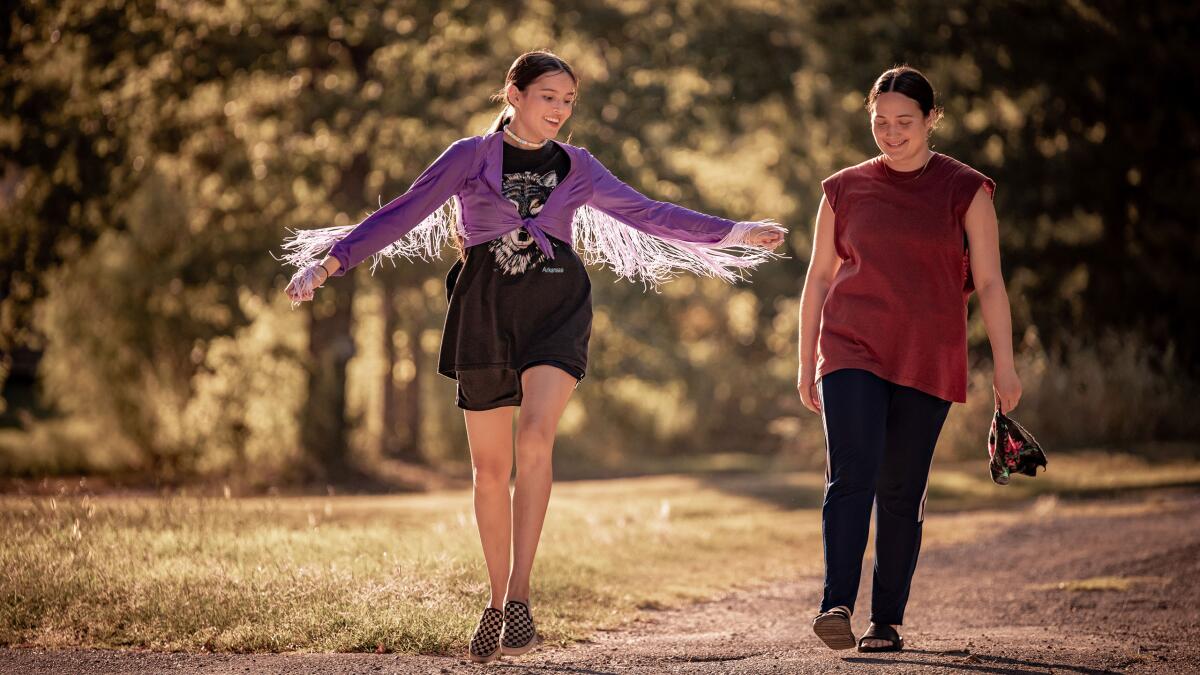Review: Native women are at the heart of the haunted ‘Fancy Dance’ — and also its victims

Lily Gladstone brings the performance wattage, and an Oklahoma of reservation life and white privilege is the evocative backdrop. But a missing Indigenous woman haunts the center of the indie drama “Fancy Dance,” which gives you an idea of the delicate mix of absence and presence that director-co-writer Erica Tremblay seeks in her lived-in, thoughtful feature directorial debut.
A Seneca-Cayuga filmmaker previously known for documentaries (and a wonderful short film, also starring Gladstone, called “Little Chief”), Tremblay infuses “Fancy Dance,” co-written with Miciana Alise, with a verisimilitude borne of knowing a place’s corners of comfort and everyday indignities. She not only has in mind the plight of devastated Native communities as she introduces tough-as-nails Jax (Gladstone) — always looking for her sister, never far away from self-inflicted trouble — but also, via the evolving bond of an aunt and niece, how bruised hearts survive in an unresponsive world.
Lily Gladstone is the first Native American to earn an Oscar nomination for lead actress. Now that she has kicked the door down, she plans on holding it open.
Jax’s teenage niece, Roki (Isabel Deroy-Olsen), is ostensibly in her care now since Roki’s mother, Tawi, a dancer at a local strip club, vanished from the rez two weeks prior. Mother and daughter had been preparing a dance for the upcoming powwow in Tulsa, and Roki — who boasts a guileless smile — hasn’t been dissuaded by her aunt that anything is amiss. But Jax, whose loose guardianship comes with lessons in five-finger discounts, is only trying to keep Roki from a terrible possibility. With the tribal cops (which include Jax’s own brother) hamstrung, and the feds indifferent to the epidemic of missing and murdered people on tribal lands, the search feels increasingly like Jax’s alone.
The situation worsens when Jax, who has a criminal record, loses custody of Roki to her white grandfather, Frank (Shea Whigham), an inattentive figure in their lives now trying to make up for lost time. Affection isn’t the problem with Frank and his wife (Audrey Wasilewski), but they exhibit little interest in the culture Roki clearly cherishes. So under the guise of taking her niece to the powwow to meet her mom, Jax flouts her biggest law yet — kidnapping — to keep Roki close and hopefully find an answer to what happened to Tawi. In well-placed moments, Samantha Crain’s wonderfully evocative score of tribal voices and spare melodies even plays as a sort of spirit guide.
We’ve mapped out 27 of the best movie theaters in L.A., from the TCL Chinese and the New Beverly to the Alamo Drafthouse and which AMC reigns in Burbank.
Surely one of the most exciting repertoires in cinema today is Gladstone’s body of rich, varied Indigenous characters, an overdue answer to the movie industry’s own sins of fostering a people’s invisibility. Her Jax — queer, vulnerable to vices and proud of teaching Cayuga to Roki — is a vivid rendering of flint and worry, suspicious of so much but poignantly sure of what needs protecting. It’s regrettable, then, that the character of Roki, as scripted, is too innocent to be fully convincing. When she’s not saddled with awkward exposition loaded into the questions she asks and beliefs she holds, Deroy-Olsen’s youthful energy is an otherwise solidly engaging partner to the embittered turmoil inside Gladstone’s Jax.
There are some script logic issues, too, starting with why authorities would blanket the media with an Amber Alert for Roki when the problem being conveyed is the law’s apathy toward missing Indigenous women. And yet Tremblay’s template for on-the-run suspense is effective, primarily by avoiding the exploitative in favor of scenes that drive home the feeling of lives susceptible to being uprooted.
Tremblay still makes points about a fickle, haphazard justice system, including in an especially tense exchange with an Immigration and Customs Enforcement agent that resolves itself unexpectedly. It’s building toward the emotional climax that she cares most about, however, and which ultimately satisfies as a depiction of how colorful, vigorous ritual expressions of honor and joy connect generations of Native women who’ve been given little reason to believe anyone else has their best interests at heart. In “Fancy Dance,” the missing are a crisis, but a culture’s rites of closure shouldn’t be endangered either.
'Fancy Dance'
In English and Cayuga, with subtitles
Rating: R, for language, some drug content and sexual material
Running time: 1 hour, 32 minutes
Playing: In limited release Friday, June 21
More to Read
Only good movies
Get the Indie Focus newsletter, Mark Olsen's weekly guide to the world of cinema.
You may occasionally receive promotional content from the Los Angeles Times.












